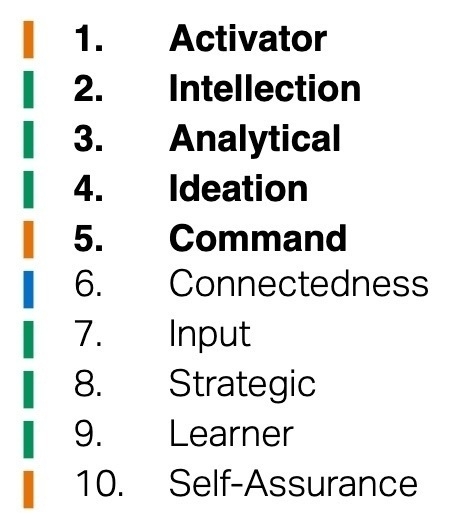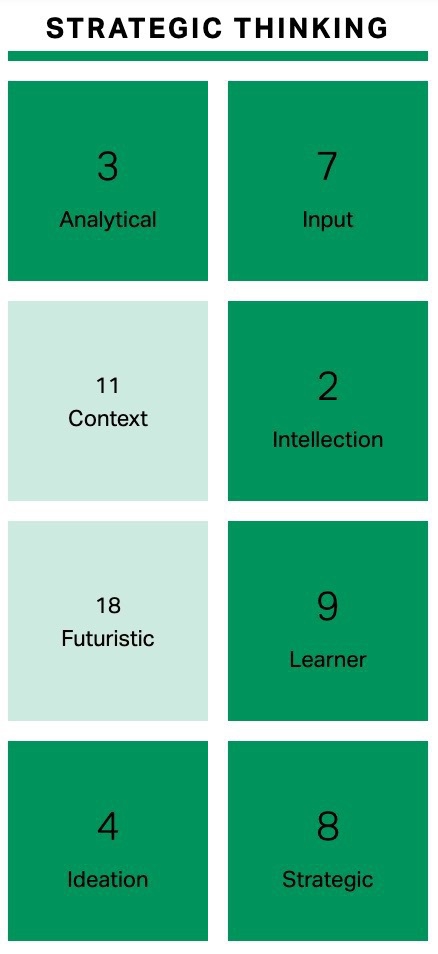Knowing My Strengths

Do you know your top strengths? When it comes to personal assessments, the Strengthsfinder (or Clifton Strengths) is my favorite. Based on research from Gallup, Strengthsfinder looks at 34 different themes, and helps you understand what your best approaches are.
You can get the Strengthsfinder 2.0 book here. It includes a code to take the short assessment and receive your top 5 strengths. (You can also unlock more of your strengths on their site.)
The research behind the strengths shows that we can make a much bigger difference by leaning into our strengths than by focusing on our weaknesses. While we might need a certain level of baseline proficiency for some roles & responsibilities, after meeting those requirements, our time is most impactful if spent on the ways where we do our best.
My top ten strengths are the following:
- Activator (I)
- Intellection (S)
- Analytical (S)
- Ideation (S)
- Command (I)
- Connectedness (R)
- Input (S)
- Strategic (S)
- Learner (S)
- Self-Assurance (I)
You may be wondering about the letter after each (or the corresponding color above). Let me explain that first. The 34 strengths are grouped into 4 categories of themes, based on how they relate to leadership.
- “I” stands for “influencing”. My #1 strength and 2 more of my top strengths are related to influencing.
- “S” stands for “strategic thinking”. A whopping 6 of my top strengths are related to strategic thinking.
- “R” stands for “relationship building”. Connectedness is my top strength related to relationship building and Individualization (not pictured) is my second highest.
- “E” stands for “executing”. Belief and Responsibility (not pictured) are my top strengths related to execution.
With all that explained, what is the overall summary of my top strengths, and what do they say about the way I best approach life?
Strategic Thinking is a major theme
There are 8 themes related to Strategic Thinking, and they dominate my top strengths.

If you know me at all, you’ve probably noticed that I’m continually learning, collecting insights, sifting through information to find the signals in the noise, clarifying situations, engaging in deep conversations, imagining possible futures, brainstorming, asking tough questions, analyzing paths of possible success & failure, and spending time in intentional reflection.
My Strategic Thinking strengths mean that I can be a major help when it comes to creating a vision, breaking new ground, developing new ideas, setting direction, focusing our attention on what matters, changing systems, and accounting for changing factors.
But there’s always a downside, right? With so many strengths related to Strategic Thinking, there is a chance that nothing comes of all that thinking. Analysis paralysis. Theory without practice. Cheap talk.
All this strategic thinking needs to actually be useful.
So what are we going to do about it?
We need an antidote for thought-without-action. Luckily, Activator, my #1 strength, is just what the doctor ordered! The Activator theme is precisely about turning thoughts into action.
Leading from this strength means I’m always looking at what’s next, bringing energy and excitement to it. Having a vision of a future is great, but it starts to become reality when I’m spurring myself and others to actually get moving in that direction. I don’t leave important conversation without concrete next steps, even if those steps are small ones. Building on that excitement and momentum is key to getting change happening.
Activator, combined with my Strategic Thinking strengths, means I’m eager to actually test out theories and get rapid feedback. We can get real data to know if the approach needs to change, move full speed ahead, or be shelved to make room for something better. Innovative ideas plus rapid feedback cycles are how we evolve.
My so-far-unmentioned top talents also relate to Activator, too. With Connectedness, I am often bringing people together and sharing the broader picture, both of which helps people rally around the cause. Command and Self-Assurance mean people often look to me to make tough decisions in risky situations, reassure or inspire them, and help remove roadblocks & barriers. These, too, help us make progress even with things are hard.
But again, there is a drawback to all this quick movement, motivation, and momentum. I can impatient and tough. I have to be careful not to set too high of standards or push too hard, or I risk burnout and hurting relationships. To counter this, I must repeatedly go back to the Strategic Thinking strengths: pushing hard only where it makes a big & lasting difference, making sure we have time to recharge & reflect, and adapting systems to make changes more sustainable.
What about you?
Do you know your strengths? How do you use them?
@joshuapsteele here's more details/context
Thanks! Very helpful!